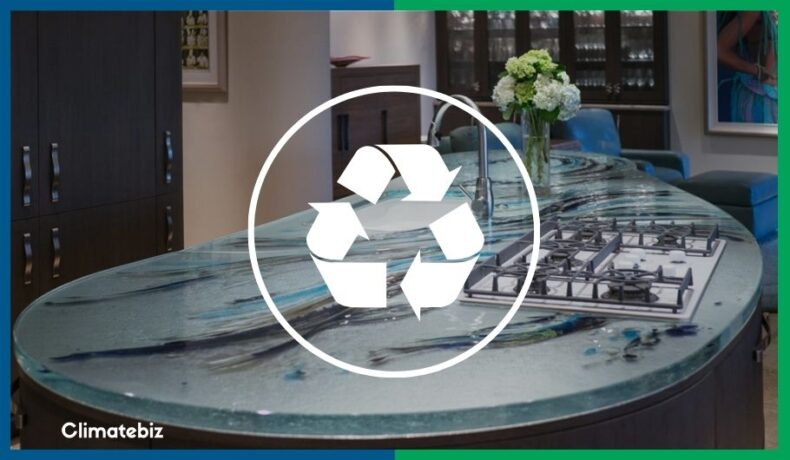As technology advances, so does eco-design. No longer is overly-priced store-bought decor the king. Nowadays, homeowners can go as far as furnishing their households with classy repurposed materials, like recycled glass countertops.
From these tabletops to kitchen windows, glass is essential for sleek, modern design. But what happens to all of the used glass?
Most glass waste ends up in landfills or, even worse, in our natural environment. For example, 60% of glass ends up in landfills, equating to around 7.6 million tons of waste.
Luckily there’s a way to recycle this glass and give your home some style while retaining its eco-friendly nature.
Recycled glass countertops trap the glass in a binder and allow you to use it as a countertop. Having recycled glass as a design feature in your home is better than having it in a landfill.
Table of Contents
What Are Recycled Glass Countertops?
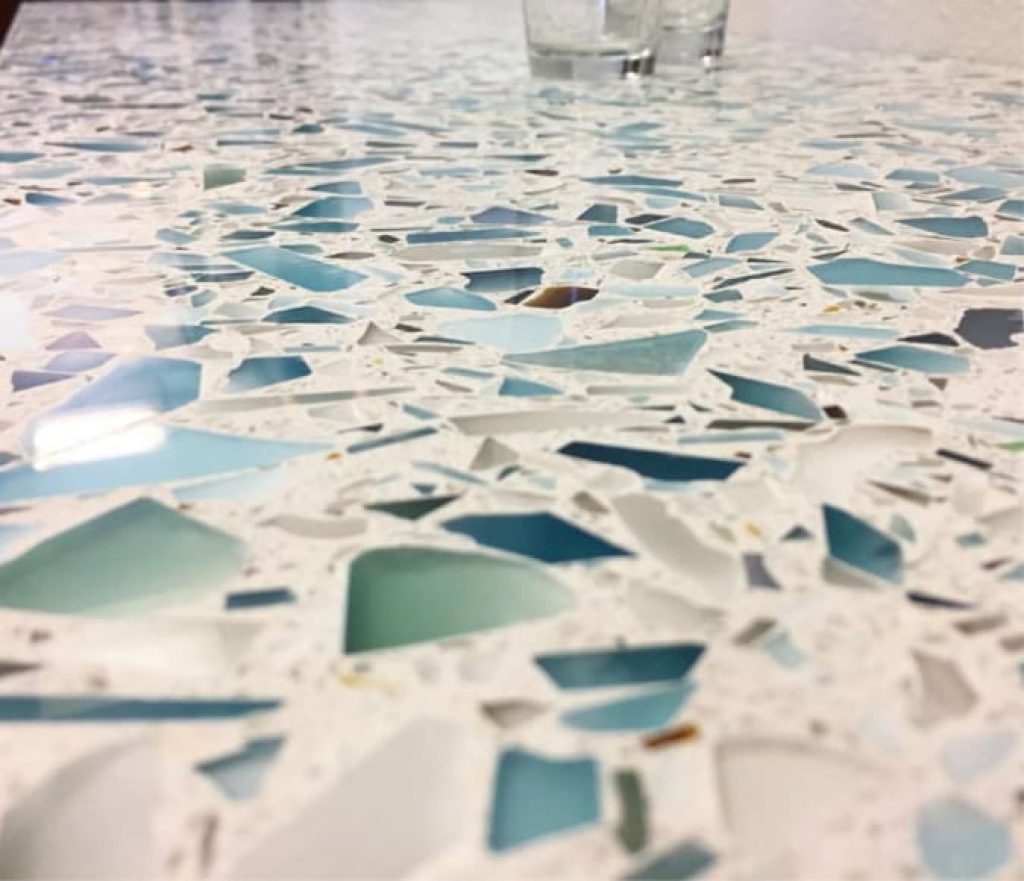
Source: countertopspeciality
Recycled glass countertops are glass shards set into a resin or cement binder. The result? A smooth kitchen countertop, perfect for all designs.
Recycled glass countertops are similar to other surfaces like marble, granite, or quartz.
Manufacturers set the glass into either a resin or cement binder. This process creates a speckled or flaked look. In architecture, we refer to this style as terrazzo.
Originally from 18th Century Italy, terrazzo tiles were made from left-over marble set into clay. Nowadays, terrazzo has developed into many variations, like granite set into polished concrete.
Terrazzo is generally more expensive than ordinary flooring. However, having a recycled glass countertop that resembles it can look stunning and elegant for a bargain.
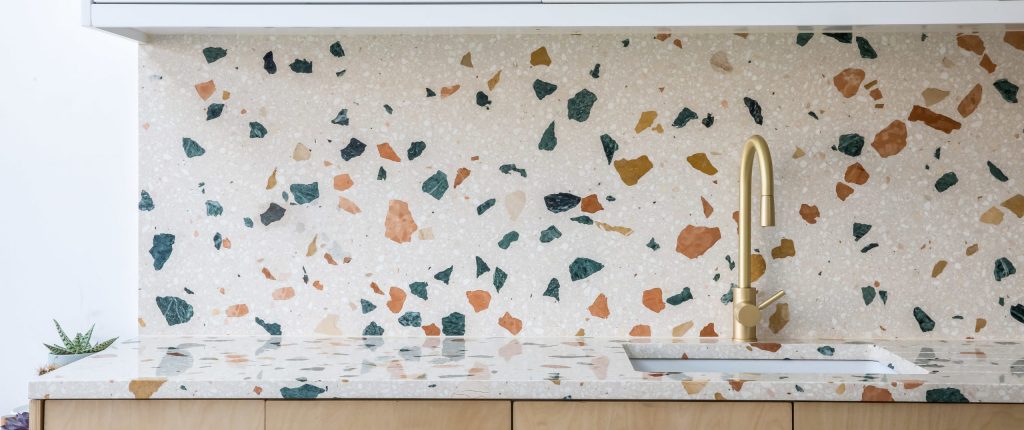
Source: diespeker
Types Of Recycled Glass Countertops
Glass comes in all sorts of colors, from deep purple to lime green. So it’s no surprise that recycled glass countertops come in various colors too.
But color is only one element of this glass. There are also multiple finishes to choose from.
As previously mentioned, glass countertops can be resin or cement-based. Each has different characteristics, like its look and feel, durability, and cleaning methods.
Cement-based Glass Countertops
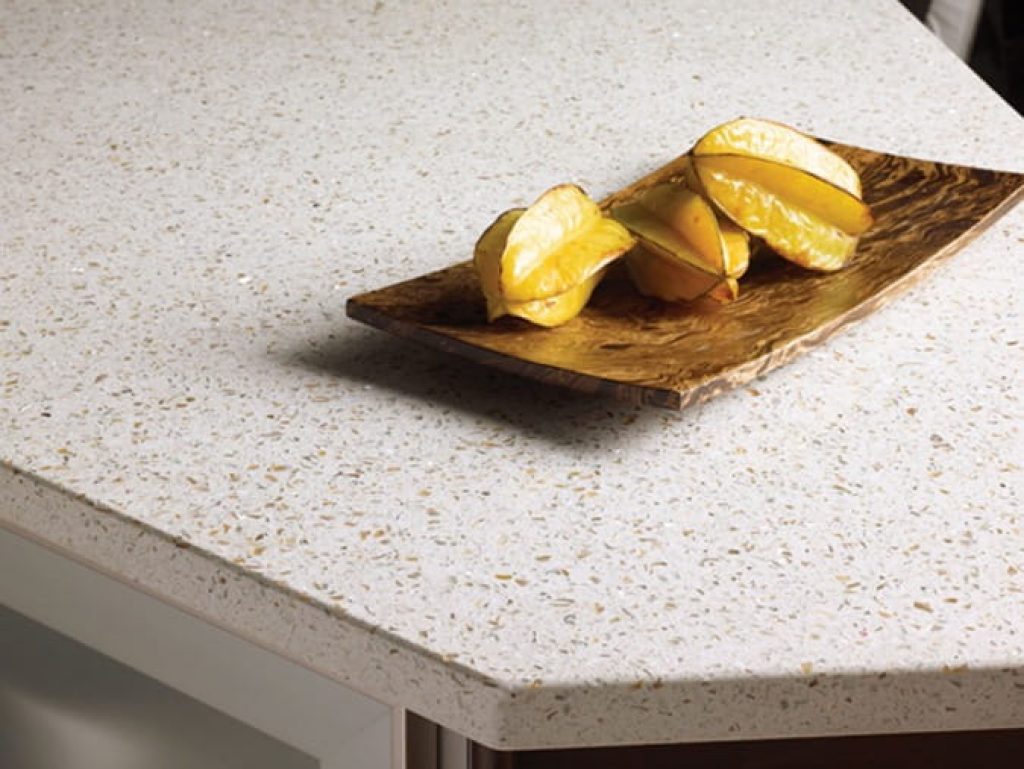
Source: countertopspecialty
Cement-based glass countertops use cement as the filler between the glass shards. The cement can then be polished and sealed.
While the countertop won’t be as shiny as marble or quartz, it’ll still catch your eye.
Resin-Based Glass Countertops
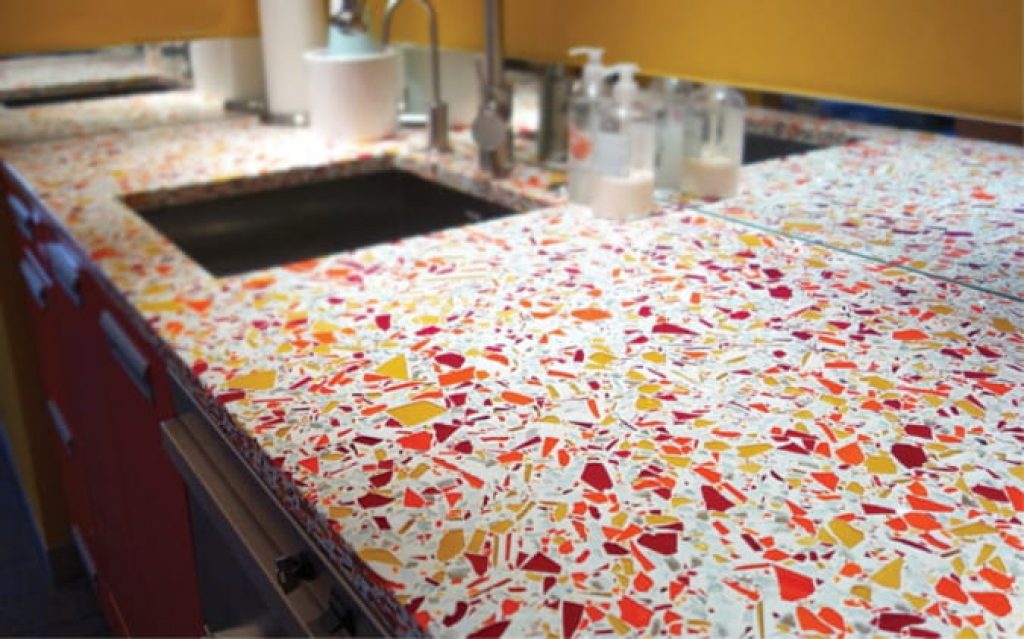
Source: countertopspecialty
Epoxy resin is a material that finds its way into more homes each year. It originally started off as a type of flooring. Now, epoxy resin is used for countertops.
Resin-based glass countertops have the glass shards set into the resin before it’s poured. As a result, the resin hardens and traps the glass shards.
The epoxy resin is either clear (using the glass as detail) or colored (matching the glass).
The biggest issue with resin-based glass countertops is that they can scratch easily. So don’t drag items across them.
How Are Recycled Glass Countertops Made?
Recycled glass pieces are added to a base made out of resin or cement. The base and glass are then processed and turned into slabs — the process for each type of base differs slightly.
Resin-Based Countertops
The process of making a resin-based glass countertop is similar to how quartz counters are made.
First, the recycled glass is collected and processed. This means that the glass is shattered and cleaned. Sometimes the glass is tumbled; this removes unwanted jagged edges.
The glass is then added to the resin. Most countertops have a ratio of 80% glass to 20% resin, but this depends on the manufacturer.
Finally, the resin, which has the glass suspended inside, is placed under immense heat and pressure. This forces the materials into a dense slab that can then be cut into shape.
Cement-Based Countertops
The beginning of this countertop has a similar process to resin-based countertops.
First, the glass is shattered, washed, and tumbled. In this case, only the glass exposed to the surface will be seen.
Next, formwork is laid out for the cement casting. This means that wooden planks are set up to create the shape of the slab.
After that, a steel wire mesh is added. This reinforces the cement slab and increases both the durability and span of the slab.
Colour is then added to the cement whilst mixing, along with the glass shards.
Next, the cement is poured onto the steel mesh. The cement spreads out, filling the space, and is then made smooth with plaster trowels.
Thereafter, the cement is left for a week or two to cure properly before the formwork is removed.
Finally, the countertop is then sealed with a cement sealant. Manufacturers use sealers that are food safe and heat resistant. Finally, for an extra layer of safety, the countertops are waxed.
How Much Do Recycled Glass Countertops Cost?
Calculating the cost of countertops is tricky. There are many factors that influence the end price. However, you can expect to pay anything from $50 to $80 /sq. ft.
The main influence on the cost of a recycled glass countertop is the design. Complicated designs will cost more, while simple designs will be standard prices.
It’s also important to remember that recycled glass countertops need a professional to install them. Unfortunately, this is often a hidden fee that most people forget to include in their budget.
| Simple Design | Complicated Design | |
|---|---|---|
| Countertop (per square foot) | $50 | $80 |
| Installation fee (once-off Fee) | $30 | $60 |
If we take the average countertop area of 30 square feet and apply these prices, your estimated budget will be:
| Design Type | /sq. ft. | 30 sq. ft | Installation Fee | Total |
|---|---|---|---|---|
| Simple Design | $50 | $1500 | $30 | $1530 |
| Complicated Design | $80 | $2400 | $60 | $2460 |
The above calculations show that you can expect to pay between $1500 and $2500 for recycled glass countertops.
Let’s put this into perspective and compare it to the cost of quartz countertops. Quartz is generally an expensive material for countertops but offers the same look and feel.
| Glass Countertop (30 sq. ft)(Average without Installation) | Quartz Countertop (30 sq. ft)(Average without Installation) | Difference | |
|---|---|---|---|
| Price Comparison | $1950 | $1500 | $450 |
Recycled glass countertops are more expensive, making quartz a cheaper option if you’re looking for the terrazzo style.
Are Recycled Glass Countertops Worth The Cost?
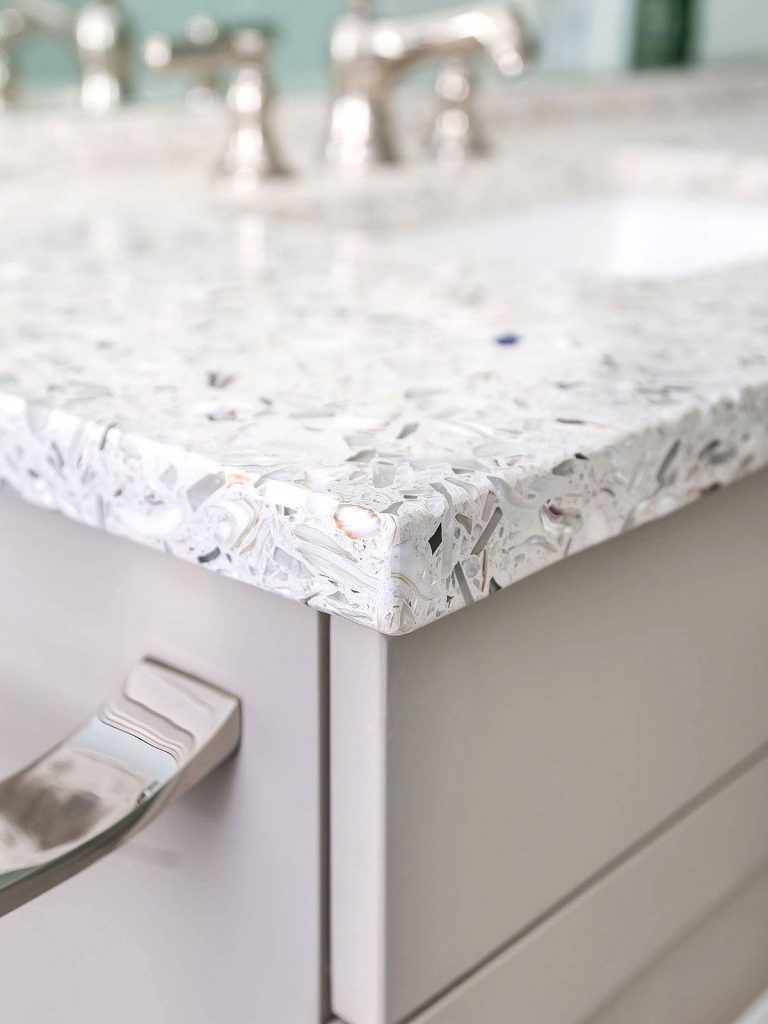
Source: backsplash
Recycled glass countertops aren’t just worth the money because of their looks; they’re also worth it because of their eco-friendly nature.
How Does Recycling Glass Help The Environment?
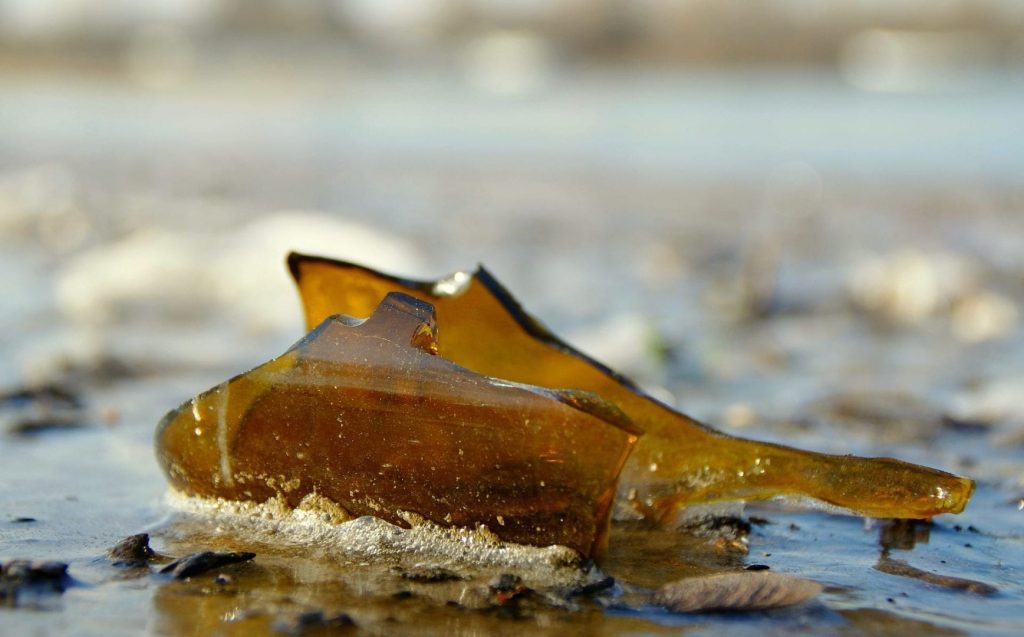
Source: infrastructurenews
Did you know that recycling glass can curb material wastage by 80%? The University of Southern Indiana complied a quick fact sheet about recycling glass.
Raw material wastage from the production of glass is also responsible for both air and water pollution. Recycling glass curbs this by 20% and 50%, respectively.
Glass is an excellent magnifier, hence why some of us wear glasses. However, this magnification turns glass bottles in an open field into a potential fire hazard.
Glass is an amazing building material but not for the environment — it can take 4000 years or more to decompose! That’s why it’s so important to remove the glass from our natural environment and recycle it instead.
How Much Glass Is Recycled
According to the United States Environmental Protection Agency (EPA), 12.3 million tons of glass was produced in 2018. The scary part? Only 3.1 million tons of that glass was recycled.
Sure, some of the glass produced might still be in use, so is 3.1 million tons really that bad?
The same study showed that 7.6 million tons of that 12.3 million tons ended up in landfills (That’s 61% of glass produced).
Related Reading: Eco-Friendly House: 10 ways to transform your home
Are Glass Countertops Worth The Buy?
If you’re looking for a unique countertop that is just as elegant as quartz, glass countertops might be for you.
80% of recycled glass countertops are glass. These countertops are the perfect way to lower your home’s carbon footprint.
By now it’s obvious that recycled glass countertops are more sustainable. But what other reasons make them worth the cost?
Here are a couple of reasons that we could think of:
- Unique
- Customizable
- More scratch resistant than marble
- Easy to maintain
Completely Unique
Recycled glass countertops are made using different glass chips and will always come in different patterns.
There are tons of options to choose from, meaning that no other countertop will look like yours.
If uniqueness is what you’re looking for, this product is for you.
Unlimited Customisation
As we’ve just hinted at, the countertop will look exactly how you want it to look. You should see the designs out there — from counters with deep red glass chips suspended in clear resin to black glass set in stone-like cement.
It’s important to note that manufacturers might charge extra for this service, depending on the surface area of the countertop.
More Scratch Resistant Than Other Materials
“Are they prone to scratches?“. This is a common question when it comes to countertops.
Recycled glass countertops are scratch-resistant, but not scratch-proof. The cement and resin will prevent your counters from scratching easily.
However, if you drag sharp objects or use them as a cutting board, they will scratch.
Easy To Maintain
This section is mostly self-explanatory. However, there are some things you should note:
Firstly, while the surface will wipe clean with ease, it’s important to watch out for stains. Resin-based countertops stain easily from acid substances like tomatoes.
Secondly, cement-based countertops NEED to be sealed. If not, you’re going to have many issues like stains and erosion!
Are Recycled Glass Countertops Cheaper Than Granite?
We’ve already compared glass countertops to quartz, but what about granite? The answer is yes; in general, recycled glass countertops are cheaper than granite.
Granite is a natural stone mined from quarries, cut into slabs, and polished. It’s a beautiful countertop but comes with a price.
Granite is an expensive option due to all the processing and transporting of the material.
However, granite does have some advantages over recycled glass countertops, like its durability.
Let’s review the average prices for recycled glass countertops:
| Simple Design | Complicated Design | |
|---|---|---|
| Countertop (per square foot) | $50 | $80 |
| Installation fee (once-off Fee) | $30 | $60 |
Here are the average prices for granite countertops:
| Simple Design | Complicated Design | |
|---|---|---|
| Countertop (per square foot) | $85 | $115 |
| Installation fee (once-off Fee) | $30 | $60 |
A quick overview will show you that granite is more expensive than recycled glass countertops.
If you’re curious, the below table shows the price difference between the two materials:
| Glass Countertop (30 sq. ft)(Average without Installation) | Granite Countertop (30 sq. ft)(Average without Installation) | Difference | |
|---|---|---|---|
| Price Comparison | $1950 | $3000 | $1050 |
Are Recycled Glass Countertops Strong Enough?
Recycled glass countertops are a strong and durable option for your kitchen.
Depending on the binding, recycled glass countertops can be as strong and durable as quartz countertops. The resin binder is extremely strong, and the cement binders are reinforced.
The countertops are strong enough to support all your needs kitchen requirements — heavy pots and pans, coffee equipment, or other kitchen appliances.
Here’s the catch — as strong as recycled glass countertops are, they have their weaknesses; chipping is one of them.
On the surface, that doesn’t seem like such an issue. The real problem here is that they can’t be fixed easily. Glass countertops will require a professional to fix them, and most likely, the section will need to be replaced.
So if you’re opting for a recycled glass countertop, remember to be careful with heavy pots and pans. The last thing you’d want to do is drop them.
Can You Put Hot Pans On Recycled Glass Countertop?
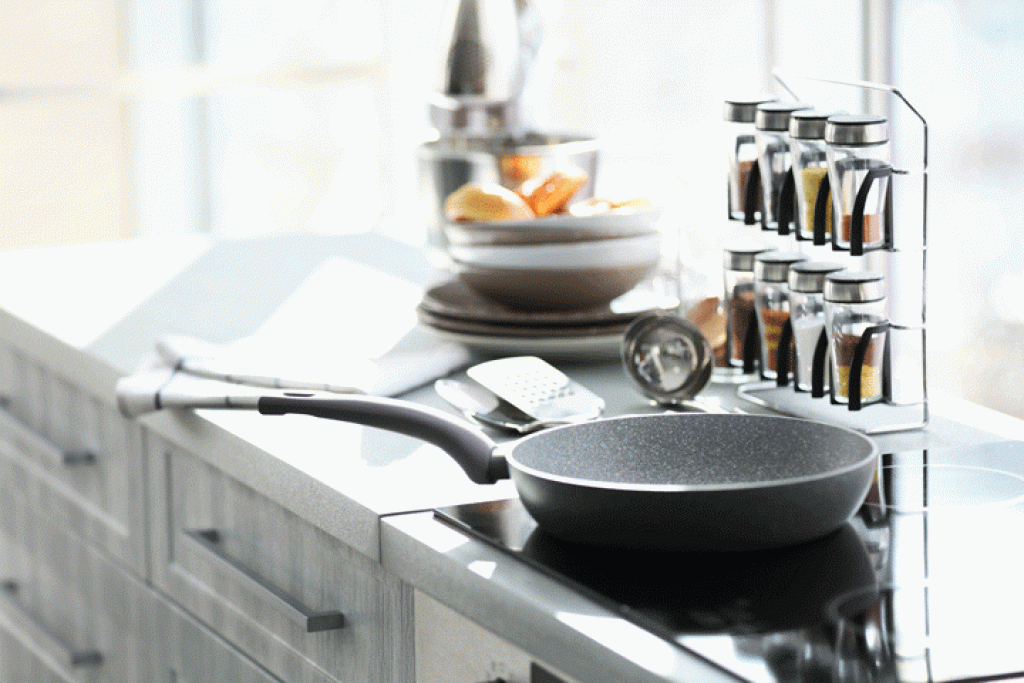
Source: marble.com
Speaking of weaknesses; there is a slight chance that your recycled glass countertop could crack from hot pans.
This isn’t a common issue as the binder often protects the countertop, allowing you to place hot objects on it.
The issue comes in when the counter rapidly heats and cools.
Glass is a material that cracks when there’s a drastic change in temperature. This means that the glass chips in the counter might crack when placing hot pans on the surface.
And even if you are the unlucky one whose glass cracks, it’s not the whole counter. It would just be the small glass shards within the counter. Cement can withstand the change in temperatures, and so can the resin.
If you’re worried, use a countertop protector.
Do Glass Countertops Scratch Easily?
This is a pretty controversial topic — the answer depends on the type of research you conduct. We’ve come to the conclusion that recycled glass countertops are scratch-resistant but not scratch-proof.
This is echoed in our previous section — glass countertops are more scratch-resistant than marble. However, they’re not scratch-proof.
Some materials like quartz are scratch-proof. Meaning you can literally chop vegetables on their surface.
Unfortunately, glass countertops don’t offer the same type of protection.
You’ll need to be extra careful when it comes to dragging heavy things across the counter or sharp objects.
The cement-based countertops will be more scratch-resistant than the resin, but they can etch away if not sealed properly.
Final Thoughts
Recycled glass countertops are a great option when considering an eco-friendly material for your kitchen.
The countertops are durable, solid, and stunning. They make for the perfect feature in your home without having to worry about your carbon footprint.
While they can scratch, chip, and stain; when maintained properly, recycled glass countertops offer many benefits.
Some of these benefits include uniqueness, eco-friendly aspects, easy maintenance and customisability.
However, these countertops do come at a price. They’re more expensive than other resin-based countertops like quartz.
This said, they’re still way cheaper than granite and offer a personal touch that granite can’t. You can choose the color of both the binder and the glass.
These customizations allow the countertops to blend perfectly with your kitchen’s design.
At the end of the day, recycled glass countertops are a great buy and definitely worth the price!

